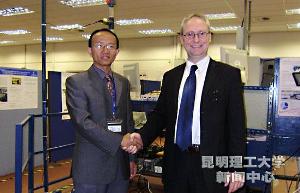Sep 29 2014
The researchers from the University of Huddersfield have collaborated with the Kunming University of Science and Technology (KUST) in order to perform a detailed analysis of the Friction Stir Welding (FSW) technique.
 Pictured are the University of Huddersfield's Professor Andrew Ball (right) of the Centre for Efficiency and Performance Engineering is Professor Xiaocong He of Kunming University of Science and Technology's (KUST) Innovative Manufacturing Research Centre. Credit: University of Huddersfield.
Pictured are the University of Huddersfield's Professor Andrew Ball (right) of the Centre for Efficiency and Performance Engineering is Professor Xiaocong He of Kunming University of Science and Technology's (KUST) Innovative Manufacturing Research Centre. Credit: University of Huddersfield.
The partnership included Andrew Ball and Dr Fengshou Gu from the Centre for Efficiency and Performance Engineering at University of Huddersfield, and Professor Xiaocong He from the Innovative Manufacturing Research Centre at KUST.
Invented in 1991, the Friction Stir Welding (FSW) technique is useful for joining materials that are difficult to weld such as plates made of different materials or with different thicknesses.
FSW is a complex technique that plays a critical role in modern production processes as there is a huge demand for lightweight structures and methods for joining them.
It reviews the current advancements in numerical analysis of friction stir welded joint microstructures, their processes and structure properties. The researchers state that better scientific understanding of the process is required.
The authors conclude that the findings presented in the journal would serve as a base for further study, as significant challenges still remain in FSW’s analysis and development. This study has been published in Progress in Materials Science, a prestigious international journal.